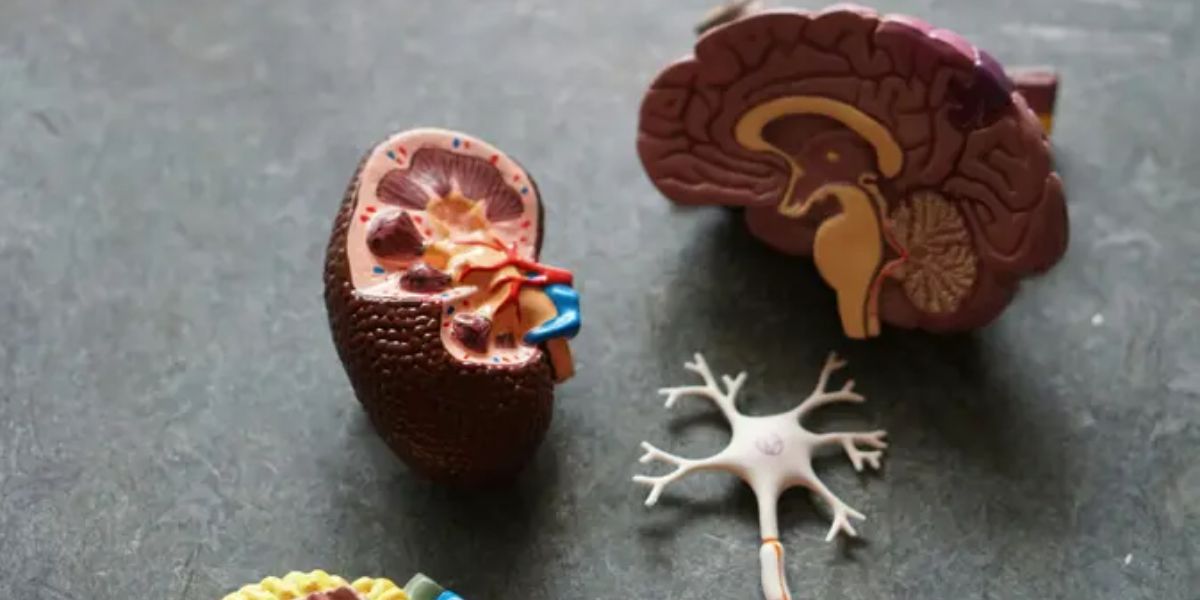Kapanlagi.com - Kidney disease often comes without symptoms, especially in the early stages. However, our kidneys play a very important role in maintaining the body’s health. Properly functioning kidneys filter waste and excess fluid from the blood, maintain electrolyte balance, and regulate blood pressure. However, when kidney function is impaired, the early symptoms are often unnoticed and considered trivial. This can be a signal of a serious problem that requires immediate attention!
In the early stages of kidney disease, our body provides several clues that are often hidden or resemble symptoms of other diseases. These symptoms can be mild or even completely unnoticeable, but if ignored, they can develop into more serious conditions. Therefore, it is important to recognize the signs of kidney disease early so that we can prevent further damage and other health complications.
Do not underestimate the early symptoms that may appear! If you experience signs related to kidney health, seek medical examination immediately. In this article, we will discuss several signs that you should be aware of as early-stage kidney disease indicators, so that you can receive the appropriate treatment promptly.
1. Causes of Kidney Disease
Kidney disease can be caused by various factors, including genetic factors, lifestyle, and certain medical conditions. Some of the main causes of kidney disease that need to be watched out for include:
1.Diabetes (Diabetes Mellitus)
Diabetes is one of the main causes of kidney damage. This condition can damage the small blood vessels in the kidneys, impairing their ability to filter waste and fluid from the blood. If not managed properly, diabetes can lead to chronic kidney disease, which can progress to kidney failure.
2.Hypertension (High Blood Pressure)
Uncontrolled high blood pressure can also damage blood vessels in the kidneys, reducing their ability to filter waste from the blood. Over time, this condition can lead to advanced kidney disease. Therefore, it is important to control blood pressure with a healthy lifestyle and appropriate medication.
3. Urinary Tract Infection (UTI)
Recurrent urinary tract infections can spread to the kidneys and cause kidney infections (pyelonephritis). If not treated properly, kidney infections can damage the kidneys and lead to more serious health problems.
4. Polycystic Kidney Disease
Polycystic kidney disease is a genetic disorder that causes the formation of cysts (fluid-filled sacs) in the kidneys. These cysts can interfere with kidney function, and over time, can lead to kidney failure.
5. Use of Certain Medications
The use of certain medications, especially nonsteroidal anti-inflammatory drugs (NSAIDs) and certain antibiotics, in the long term or at high doses can damage the kidneys. The use of illegal drugs or medications without a doctor's prescription can also lead to kidney damage.
6. Chronic Dehydration
Dehydration that occurs over a long period can lead to kidney function disorders, as the kidneys require enough fluid to filter body waste. A lack of fluid can increase the burden on the kidneys, which ultimately risks causing damage.
7.Unhealthy Lifestyle
An unhealthy lifestyle, such as a diet high in salt, lack of exercise, smoking, and excessive alcohol consumption, can increase the risk of kidney disease. Conditions such as obesity and high cholesterol levels can also heighten the risk of kidney disease.
2. Signs of Early Stage Kidney Disease
Early-stage kidney disease often does not show clear symptoms, so many people are unaware that they are experiencing it. However, the body actually provides some signs that can be indicators of kidney problems. Here are some signs of early-stage kidney disease that you should be aware of:
1.Often Feeling Tired or Excessively Fatigued
One of the most common symptoms of early-stage kidney disease is excessive fatigue. Poorly functioning kidneys cannot efficiently remove waste, leading to a buildup of toxins in the body, which reduces your energy. You may feel more tired than usual even if you are not engaging in heavy physical activity.
2.Changes in Urination Frequency
Changes in urination frequency can be a sign of kidney problems. You may feel the need to urinate frequently, especially at night, or you may have difficulty urinating. The color of urine can also change, for example, becoming darker or even containing blood, which can indicate an infection or disorder in the kidneys.
3. Swelling in the Body
Kidneys that are not functioning properly can cause fluid buildup in the body. This can lead to swelling, especially in the hands, feet, ankles, or around the eyes. This swelling occurs because the kidneys cannot expel excess fluid, causing it to accumulate in the body.
4. Unusual Breath Odor (Ammonia)
If the kidneys begin to fail in processing waste, toxins like urea can accumulate in the blood and change the breath odor to resemble ammonia or urine. This is known as uremic fetor and can be a sign of progressing kidney disease.
5. Nausea and Vomiting
Due to the accumulation of waste and toxins in the body, you may experience nausea, vomiting, or loss of appetite. This occurs because the kidneys can no longer efficiently remove waste, which affects digestion and makes the body feel uncomfortable.
6.Back or Side Pain
Pain in the back or side, just below the ribs, can be a sign of problems with the kidneys. This pain can occur when the kidneys are inflamed or infected, although it does not always indicate serious kidney disease.
7.Dry or Itchy Skin
Dry or itchy skin can be a sign of decreased kidney function. When the kidneys are unable to properly regulate fluid and electrolyte balance, the body can lose moisture and essential minerals, leading to dry and itchy skin.
3. Management of Early Stage Kidney Disease
Early-stage kidney disease management is crucial to prevent more severe kidney damage and slow the progression of the disease to more advanced stages. In the early stages, treatment focuses on addressing the underlying causes of kidney disease and maintaining kidney health to function optimally. Here are some common management steps for early-stage kidney disease:
1. Controlling Underlying Causes
If kidney disease is caused by another medical condition, such as diabetes or hypertension, managing that condition is very important to prevent further kidney damage.
- Diabetes: Controlling blood sugar levels with medications or healthy lifestyle changes is crucial to prevent kidney damage. Regular monitoring of blood sugar levels and following doctor’s recommendations can help reduce risks.
- Hypertension (high blood pressure): Controlling blood pressure with antihypertensive medications, as well as maintaining a low-salt diet and being physically active, is very important. Controlled blood pressure can prevent further damage to the blood vessels in the kidneys.
2. Dietary Changes and Healthy Lifestyle
A healthy diet and good lifestyle can help lighten the load on the kidneys and prevent further disease progression.
- Low-salt and low-protein diet: Reducing salt intake can help lower blood pressure and reduce swelling. In addition, excessive protein consumption can worsen the burden on the kidneys, so a low-protein diet may be recommended by doctors.
- Maintain ideal body weight: Obesity is a risk factor for kidney disease, so it is important to keep body weight within a healthy range. Regular exercise and a balanced diet can help achieve this.
- Stay hydrated: Although too much fluid can also burden the kidneys, keeping the body hydrated is important, especially if there is a risk of dehydration.
3. Treatment and Regular Monitoring
In addition to lifestyle changes, medical treatment is also essential to address early-stage kidney disease.
- Medications to control blood pressure or diabetes: Medications such as ACE inhibitors or ARBs (Angiotensin Receptor Blockers) are often used to reduce protein in the urine and control blood pressure in patients with kidney disease.
- Supplements or medications to address electrolyte imbalances: Some kidney disease patients may require supplements to maintain electrolyte balance, especially potassium, sodium, and phosphorus.
4. Avoiding the Use of Kidney-Damaging Medications
The use of certain medications can worsen kidney conditions, especially nonsteroidal anti-inflammatory drugs (NSAIDs), pain relievers, and certain antibiotics. If you have kidney disease, it is important to avoid using these medications without strict medical supervision.
5. Regular Monitoring of Kidney Function
Routine medical check-ups are crucial for monitoring kidney function. Tests such as blood creatinine level, estimated glomerular filtration rate (eGFR), and urine analysis can help doctors evaluate how well the kidneys are functioning and detect changes over time. This monitoring allows doctors to adjust treatments to keep the kidneys functioning well.
6.Patient Education and Psychological Support
Kidney disease can cause stress, anxiety, or depression. Therefore, patient education and psychological support are also very important in managing kidney disease. Understanding the condition of kidney disease and ways to manage it can help patients feel more in control and have a positive outlook on their treatment.
Early intervention in early-stage kidney disease can help slow the progression of kidney damage and maintain the patient's quality of life. Therefore, if you experience any suspicious symptoms, consult a doctor immediately to obtain the proper diagnosis and treatment.
4. FAQ
1.What are the symptoms of early-stage kidney disease?
In the early stages, the symptoms of kidney disease are often not clearly visible or very mild. However, some signs that may appear include excessive fatigue, swelling in the body (especially in the hands, feet, and around the eyes), changes in urination frequency, and pain or discomfort in the lower back. Nausea, vomiting, and itchy skin can also be signs.
2.What are the main causes of early-stage kidney disease?
The main causes of early-stage kidney disease are often related to underlying medical conditions, such as diabetes, hypertension (high blood pressure), recurrent urinary tract infections, or polycystic kidney disease. Unhealthy lifestyles, such as consuming high-salt foods or smoking, can also increase the risk of kidney disease.
3.Can early-stage kidney disease be cured?
Early-stage kidney disease can generally be managed with lifestyle changes, medical treatment, and management of underlying conditions, such as diabetes and hypertension. Although kidney damage cannot be completely cured, proper treatment can prevent further damage and slow the progression of the disease to advanced stages.
4. How can early-stage kidney disease be prevented?
To prevent early-stage kidney disease, it is very important to maintain a healthy diet, exercise regularly, control blood pressure and blood sugar, and avoid smoking and excessive alcohol consumption. Additionally, make sure to drink enough water and avoid using medications that can harm the kidneys without a doctor's prescription.
5. What tests are performed to diagnose early-stage kidney disease?
Doctors usually perform several tests to evaluate kidney function, such as blood tests to check creatinine levels, estimated glomerular filtration rate (eGFR), and urine tests to detect the presence of protein or blood. These tests help determine the extent of kidney damage and whether the kidneys are still functioning well.
6. Does early-stage kidney disease always show symptoms?
Not always. In the early stages, many kidney disease patients do not experience clear symptoms. Therefore, it is very important to have regular check-ups, especially for those with high-risk factors, such as diabetes, hypertension, or a family history of kidney disease.
7. What treatments are available for early-stage kidney disease?
Treatment for early-stage kidney disease typically involves managing the underlying conditions, such as controlling diabetes, lowering blood pressure, and reducing salt intake. Doctors may also prescribe medications to reduce protein in the urine and maintain the body's electrolyte balance. Lifestyle changes, such as a healthy diet and exercise, are also very important.
8. Can early-stage kidney disease improve with lifestyle changes?
Yes, healthy lifestyle changes can help slow down or even reverse kidney damage in the early stages. Managing diet, exercising regularly, maintaining an ideal weight, and avoiding bad habits like smoking are crucial for kidney health.
9. How long can someone live with early-stage kidney disease?
With appropriate treatment and lifestyle changes, a person with early-stage kidney disease can have a long life expectancy and a good quality of life. Routine monitoring and proper management can help prevent diseases from progressing to more severe stages.
10. Can early-stage kidney disease be detected through routine examinations?
Yes, routine examinations are very important for detecting early-stage kidney disease, especially for those with high-risk factors. Blood and urine tests can identify problems in the kidneys before symptoms appear, allowing for earlier treatment that can slow the progression of the disease.
If you have suspicious symptoms or have risk factors for kidney disease, consult a doctor immediately for an accurate diagnosis and optimal management.
(kpl/rmt)
Disclaimer: This translation from Bahasa Indonesia to English has been generated by Artificial Intelligence.












